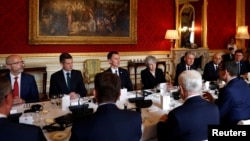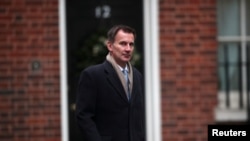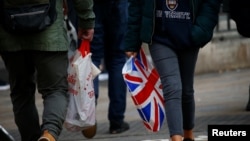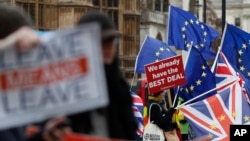British ministers are seeking to rebrand Britain for the country’s exit from the European Union, but they’re divided — as their critics are — about how the country should see itself and be seen by others post-Brexit. The divisions are revealing a country deep in the throes of an identity crisis.
The country’s defense secretary, Gavin Williamson, a candidate to succeed embattled Prime Minister Theresa May, has been invoking Britain’s imperial past and has called for the opening of new military bases in the Far East and the Caribbean to boost ‘Britain’s standing’ on the world stage and to “make Britain a true global player.”
“This is our biggest moment as a nation since the end of the Second World War, when we can recast ourselves in a different way, we can actually play the role on the world stage that the World expects us to play,” Williamson said in a recent newspaper interview.
He was unable to elaborate, though, when pressed to explain what military purpose the new bases would serve or how they would translate into trade deals to compensate for the likely post-Brexit decrease in trade with Europe, Britain’s largest trading partner. Nor has he explained how the cash-strapped British military, described by a former army chief of staff recently as “no longer fit for purpose,” could afford the new bases.
Other less military-minded ministers in May’s ruling Conservative government say Britain should look to Singapore as a role model and usher in a low-tax, deregulated future for the country. Britain’s foreign secretary, Jeremy Hunt, another possible successor when May finally quits or is ousted, wants Britain to mimic Singapore, saying it transformed itself from a “tiny territory devoid of natural resources into the world's eighth richest country.”
Now on a three-day tour of Asia, Hunt says, “There could be few better instructions for us as we make our post-Brexit future.”
But the talk of copying the Asian city-state and of pursuing a post-Brexit strategy of lower taxes, reduced public spending and fewer regulations, especially when it comes to the finance industry, in order to clear the way, in theory, for a more competitive and entrepreneurial Britain, has prompted the ire of opposition politicians, rights campaigners and organized labor leaders.
They accuse Brexiters of wanting to turn back the clock on labor standards and democratic safeguards, and to dismantle much of the welfare state. Labor leader Jeremy Corbyn argues that following the Singapore example would turn Britain into a “bargain basement tax haven” for the rich and international elites. Other critics point out that shadowy offshore financiers from the wilder reaches of “casino capitalism” and hedge-fund managers have been key donors to pro-Brexit campaigns, as well as the UK Independence Party.
Since Britons voted by a thin majority in the 2015 Brexit referendum to relinquish their 45-year-long membership of the EU, the May government led by its hardline Brexiters have sought to cast Britain’s departure as a huge opportunity that will allow Britain to embrace a golden destiny unfettered by EU rules and regulations.
Former foreign secretary Boris Johnson has urged Britons not to be afraid of “breaking out of the EU jail” and to reach for a great future outside Europe, which he promises will be filled with “sunlit uplands.” Last month, during a House of Commons debate, he was sharply rebuked by a fellow Conservative lawmaker, Roger Gale, who mocked his breezy rhetoric and in a fiery exchange demanded Johnson reveal in much clearer detail what his “big idea” means.
Taking a leaf from the marketing playbook of Tony Blair’s Labor government, which sought to increase national pride by re-branding the country “Cool Britannia,” a play on the title of the British patriotic song “Rule, Britannia,” May’s government has come up with its own catchphrase, “Global Britain,” hoping that will help unite a country bitterly at odds over Brexit.
But defining coherently what that means in practice, especially in trade, security and foreign policy terms, is proving a more difficult task. Unappeased Brexit critics charge the catchphrase merely masks a lack of preparedness by May’s government for the highly disruptive consequences of breaking with the EU.
“The ‘Global Britain’ narrative is meant to meet the British public’s great power expectations,” Thibaud Harrois, an academic at the Sorbonne University in Paris, argued in a recent paper about Britain’s role in the world after a scheduled exit from the EU on March 29.
“This narrative is far from supported by evidence and post-Brexit foreign and defense policy confirms and intensifies Britain’s already-growing isolation on the international stage,” Harrois says. He adds, “May’s ‘Global Britain’ narrative is fraught with nostalgia of a past when Britain could flourish and stand on its own, but today, to misquote U.S. Secretary of State Dean Acheson’s famous remark in 1962, Britain has lost its role and is unlikely to find an Empire.”








